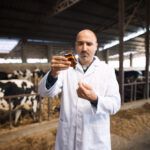c: More Than Just Farm Animals
Cows have been integral to human civilization for thousands of years. As domesticated members of the Bovidae family, they play crucial roles in agriculture, culture, and even environmental sustainability. This article explores the various aspects of cows, their significance in our lives, and their contributions to ecosystems.
A Brief History
Cows were among the first animals to be domesticated, with evidence suggesting this occurred around 10,500 years ago in regions of the Middle East. Initially, they were valued for their meat, milk, and hides. Over time, selective breeding led to the development of various breeds suited for different environments and purposes.
Types of Cows
Cows can be categorized primarily into two groups: dairy cows and beef cows.
- Dairy Cows: Breeds like Holstein, Jersey, and Guernsey are renowned for their milk production. Dairy cows are raised specifically for the purpose of providing milk, which is then processed into cheese, yogurt, and other dairy products.
- Beef Cows: Breeds such as Angus, Hereford, and Charolais are raised primarily for their meat. These cows are often selected for traits like growth rate and meat quality.
Economic Importance
Cows are vital to the global economy. The dairy and beef industries contribute significantly to food production and employment. In many countries, livestock farming is a primary source of income for rural communities. The versatility of cows extends beyond food; by-products such as leather and gelatin also play significant roles in various industries.
Cultural Significance
In many cultures, cows hold a special place. For instance, in Hinduism, cows are considered sacred and are often revered as symbols of wealth, strength, and motherly love. This cultural significance extends to festivals and rituals, where cows are honored and celebrated.
Environmental Role
Cows are also key players in agricultural ecosystems. Their grazing habits can help maintain grassland health, promote biodiversity, and even improve soil quality through manure. However, the environmental impact of large-scale cattle farming has raised concerns about greenhouse gas emissions, land use, and water consumption. Sustainable farming practices are increasingly being advocated to mitigate these issues.
Challenges and Controversies
The cattle industry faces several challenges, including animal welfare concerns, the impact of climate change, and the demand for more sustainable practices. Innovations such as rotational grazing, improved feed efficiency, and methane reduction strategies are being explored to address these challenges.
Conclusion
Cows are much more than mere farm animals; they are a vital part of our agricultural systems, cultural practices, and economies. Understanding their role in our world is essential for fostering sustainable practices that benefit both humans and the environment. As we continue to navigate the complexities of food production and environmental stewardship, the cow will undoubtedly remain a central figure in the conversation


